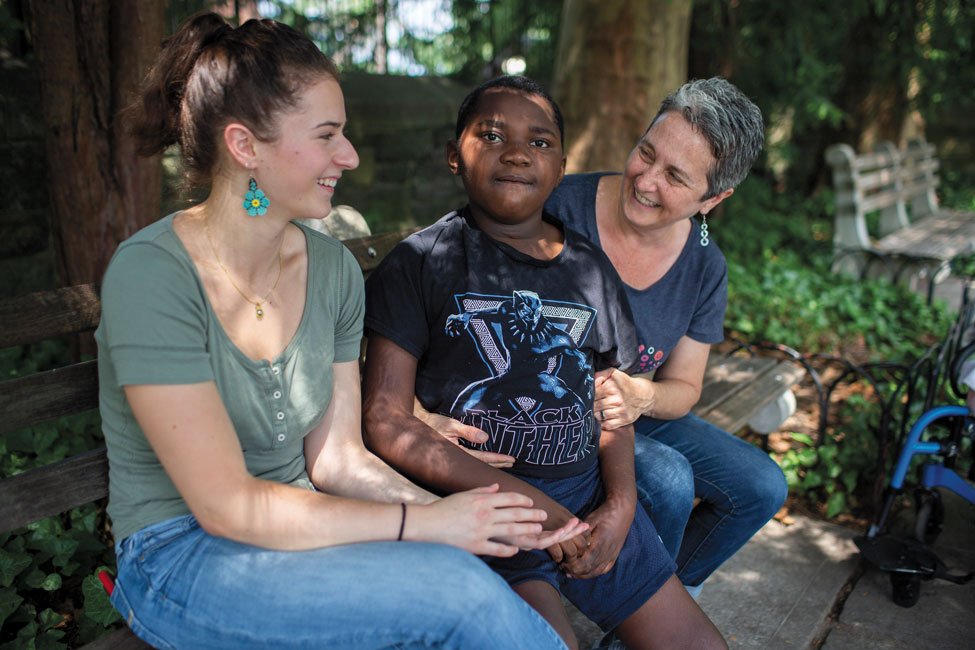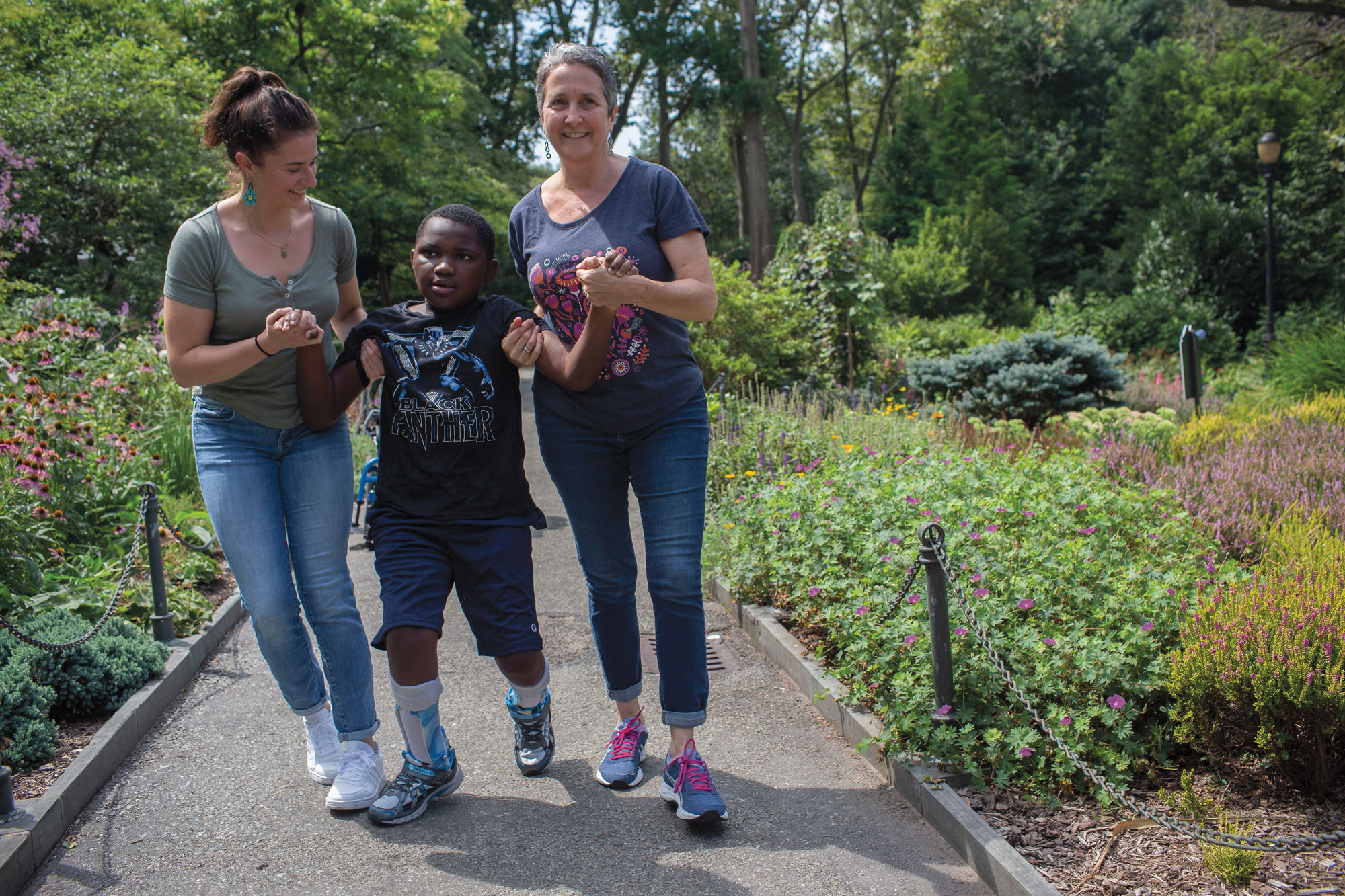Alumni Care Package: Variation on a theme
“This one should not go back to college, right?” I said to my 10-year-old son while pointing toward Sarah. His loud laughter filled the room as he rolled back and forth on a floor mat, his right fingers inside his widely smiling mouth. It was Aug. 1, 2019, and Sarah Weltz ’21 was soon heading back to Grinnell to start her third year. My son made loud grunting sounds any time we talked about Sarah’s impending return to campus. Her summer working as his caregiver and advocate had been adventurous, fun, and reaffirming of the deep connections Grinnell can foster across generations and circumstances.
Sarah and I were first connected by her roommate Lauren Miller ’21, who did a 2019 spring break externship at Global Nomads Group (GNG), a nonprofit virtual exchange and global education organization, where I am currently chief of programs and learning. After her externship I had emailed Lauren and Peony Teo ’21 (another former extern at GNG) to ask if they knew of any current Grinnellians or recent graduates who would be in New York City for the summer and might be interested in a modestly paying caregiving and advocacy job. I was impressed by both Lauren and Peony during their externships and was hoping perhaps one of them would be interested in the position. I tried to enhance the limited compensation by describing in the email “all the learning my family has to offer: health care (medical/nursing/systems/politics), rehabilitation (PT [physical therapy], OT [occupational therapy], speech), neuro-atypical communication, systems thinking, education and disability rights, jazz music, and the hard-earned wisdom and life lessons from the Warrior Prince and his weary parents.”
Lauren forwarded the email to Sarah, who is originally from New York City and was planning to live with her parents that summer. As a biological chemistry major interested in medical school, she saw the relevance of this work to her career interests and responded enthusiastically to the forwarded email (“OMG LAUREN THAT SOUNDS AMAZING! THANK YOU SO MUCH! I will contact her now!”). Soon after, we were on a FaceTime call making plans to meet.
How an Out-of-the-Blue Disease Changed Our Lives
My family’s circumstances are rather exceptional. My son, whom my husband and I adopted at birth, was perfectly healthy and typically developing until he was almost three, when a rare autoimmune encephalitis dramatically changed his and our lives. We woke up one morning to his first seizure, went by ambulance to our nearest hospital, and returned home 15 months later to vastly altered lives. Our apartment filled with medications, supplies, and equipment. Our attention shifted to our son’s moment-to-moment safety, insurance navigation, and medical bills. Our careers and professional aspirations narrowed dramatically. Our interdependence with multiple paid caregivers grew. Now, almost eight years since the onset of his illness, my son still requires round-the-clock care and is fully dependent for all activities of daily life. His recovery from the acquired brain injury caused by his disease has been glacially slow but steady. He is funny, smart, spirited, determined, nonverbal, non-ambulatory, and an incredibly good judge of character. He took to Sarah immediately. The first time Sarah met my son and me in person was on a trip to the dentist. Near the barrier-free door to my son’s school, Sarah hopped into our wheelchair accessible van and helped me navigate heavy traffic to the Bronx dental clinic (one of the few in the vicinity that both takes insurance and serves children with special medical needs). She watched attentively as I rattled off my son’s complicated health history and long list of medications, observed closely as I restrained his arms while the dentist examined and cleaned his teeth, and laughed heartily as I did a happy dance when informed that he had no cavities.
Often, new caregivers struggle to figure out ways to be helpful, but Sarah jumped right in, asking great questions and immediately demonstrating deep respect for my son. From the first time they met, she figured out that he understands everything being said and interacted with him accordingly. She avoided the common missteps of speaking to him as if he were a baby, or loudly, or simply. It takes most new caregivers a while to overcome the flawed assumption that what people express outwardly is a reliable indication of what they absorb inwardly. Sarah seemed to assume his comprehension, which in situations like my son’s is the least harmful — and, in his case, most accurate — assumption. I was also pleasantly impressed by how she made sure to talk with and to my son, rather than just with me or my husband, about him.

One Shared Summer, Lasting Connection
Our summer together was full of adventure and learning, as well as a hefty dose of daily drudgery. Thankfully, Sarah was up for all of it. She accompanied us to a Central Park race where she ran alongside my son in his wheelchair and cheered him on when we helped him out of his chair to run across the finish line with assistance. She stealthily attended to all the medical tasks of getting through our day — drawing up medications, hanging a feeding bag and priming the long plastic tubing that ultimately connects to my son’s gastrostomy tube while he sleeps, feeding my son while deftly dodging his often-flailing arms, then settling into read a book or play superhero wrestling games with him.
We have had lots of meaningful conversations, on topics ranging from our deeply flawed health care system, to the lived realities of classism and racism, to the fraught languages of adoption and disability. She has read several books and articles related to my son’s condition and our family life, as if approaching her summer job with us as a college course with a reading list we collectively curated. We had the kinds of conversations that I remember experiencing frequently at Grinnell on what we then called the Forum Beach. We have discussed how Grinnell compels its students to take a deep look at themselves, at their communities of origin, and at the broader world in ways that are unique and compelling. We have marveled at how the Iowa cornfields and vast, dramatic skies somehow provide a protected path for the common discomfort of profound personal growth.
We have met and hung out with each other’s Grinnell friends with ease and appreciation (even though my friends and I are around her parents’ age). We have shared timeless stories about picking majors, dorm life, relays, food services, campus dating, and themed parties. One of my favorite moments was when Sarah cautiously asked two of my friends whether the Alice in Wonderland parties of our time were in any way like the Alice parties of hers, then probed further to make sure that they understood exactly what distinguishes this particular party from all others. (Yes, Sarah, yes, they were then as they are now!)
For three days a week during Sarah’s time with us, my son was in an intensive assisted-walking physical therapy program. In this program, he walked on a treadmill while suspended by a harness, with his legs attached to robotic legs that guided his movements. Sarah stood by my son as he walked up to three quarters of a mile, cheering him on as she would her own teammate on Grinnell’s swim team, ultimately and effectively distracting him from any pain or discomfort he might have been feeling during his session. He rewarded her cheering by walking faster and flashing her his huge, illuminating smile.
Our common Grinnell experiences, even with 30 years between them, have proven to be a powerful bond. We share a passionate sense of wonder and curiosity. We are open to possibilities. We seek justice and call out injustice. We are radically and creatively pragmatic. We laugh when things go wrong, then try again to get them right.
So, when I told my son that Sarah shouldn’t go back to Grinnell, of course I didn’t mean that in a literal sense, and I hope she understood the ribbing as an expression of the fierce love and deep gratitude we have for her. While my whole family would have benefited tremendously had she stayed in New York City and continued to work with us, we are also incredibly excited for Sarah to have two more years of learning and growth at the college that has contributed so distinctly to the women who we both are today.

